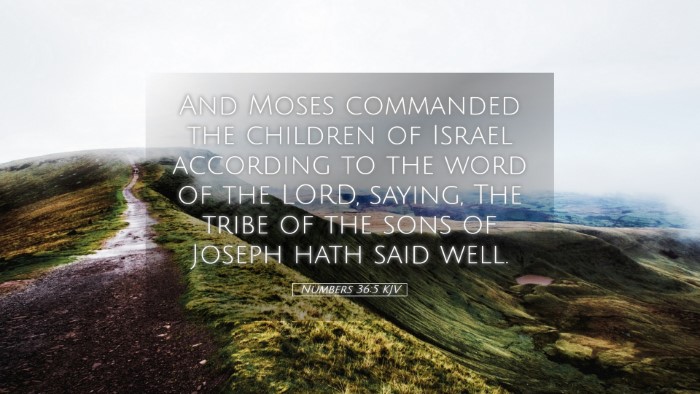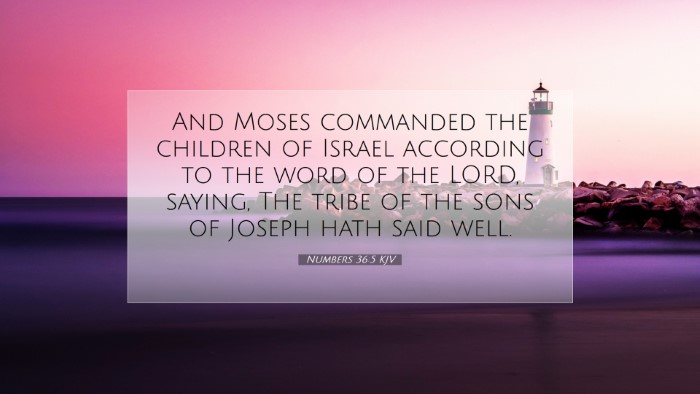Bible Commentary on Numbers 36:5
Verse (Numbers 36:5): “And Moses commanded the children of Israel according to the word of the LORD, saying, The tribe of the sons of Joseph hath said well.”
Introduction
This verse represents a critical moment in the narrative of the Israelites as they prepare to enter the Promised Land. The context of Numbers 36 reveals an important legal and theological concern regarding inheritance rights among the tribes of Israel, particularly concerning the daughters of Zelophehad. This commentary synthesizes insights from public domain scholars, highlighting key themes relevant to pastors, students, theologians, and Bible scholars.
Contextual Analysis
The chapter is set against the backdrop of the Israelites’ journey and the distribution of land. The request made by the tribe of Joseph reflects issues of justice, equity, and adherence to divine instructions concerning land inheritance.
Historical Background
Moses’ leadership and the divinely ordained structure of tribal inheritance were pivotal in maintaining Israel’s identity and unity. This moment captures the tension between divinely established law and the practical realities faced by the Israelites as they settled the land.
Cultural Implications
At the time, inheritance customs favored male heirs, yet the case of Zelophehad’s daughters prompts a reevaluation of societal norms. This illustrates a progressive aspect of God’s law, emphasizing fairness and the safeguarding of familial lines.
Theological Reflections
Through Numbers 36:5, we observe a few important theological principles:
- God’s Justice: The verse affirms that God’s laws are just and equitable. Moses acts on God’s behalf, ensuring that the concerns of Joseph’s lineage are heard and addressed.
- Obedience to Divine Command: Moses' adherence to God's directive showcases the importance of obedience in spiritual leadership. Such obedience ensures the proper functioning of community life in Israel.
- Recognition of Concern: The acknowledgment of the tribe of Joseph indicates a shared responsibility within the Israelite communities to uphold God’s laws and to recognize legitimate concerns.
Commentary Insights
Matthew Henry
Matthew Henry emphasizes the significance of proper inheritance matters within the context of Israel’s governance by divine law. He notes that the concern raised by the tribe of Joseph was not only valid but showed a deep understanding of God’s intentions for equitable distribution among the tribes. Henry highlights that Moses’ affirmation (“hath said well”) is indicative of God’s character, who desires fairness and righteousness within His people.
Albert Barnes
Albert Barnes further elaborates on the implications of the decisions made regarding inheritance. He suggests that the situation demonstrates God’s providence in addressing human concerns, stating that Moses’ instructions reflect divine wisdom. Barnes points out that this moment also serves as a model for contemporary church governance, where leaders must be attuned to the needs and voices of their congregation.
Adam Clarke
Adam Clarke provides a detailed examination of the legal intricacies regarding land and inheritance. He argues that the stipulations laid out are not merely bureaucratic but theologically significant, emphasizing the heritage of God’s people. Clarke underscores the importance of maintaining family lines and the recognition of women’s rights within a biblical framework. He advocates for a balance between tradition and the need for reform where justice is concerned.
Practical Applications
The insights derived from Numbers 36:5 encourage modern readers to contemplate several vital applications:
- Addressing Modern Legal Concerns: As societal norms evolve, the church has the responsibility to engage critically with issues of justice, inheritance, and equity in light of Scripture.
- Community and Leadership: Leaders in the church should be informed and responsive to the concerns of their congregation, promoting an environment where every voice is valued.
- Divine Law and Human Experience: There is a need to fuse theological principles with real-world applications, seeking solutions that honor both God’s Word and the current societal context.
Conclusion
In Numbers 36:5, we find a reflection of God’s justice and commitment to His people. The passage serves as a valuable resource for understanding the interplay between divine law and human circumstances. By embracing the teachings from this verse, modern believers can seek to embody God’s principles in their communities, ensuring that equity and justice prevail among all people.


